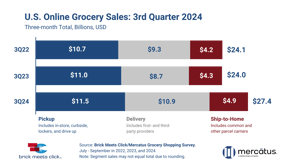RETAILERS ADVISED OF TRUST AS SALES BOOSTER
CHICAGO -- Food retailers who build trust among their shopper base stand to realize a minimum of 23% in sales over their competition, according to research presented by Service Industry Research Systems, a market research and consulting firm based in Highland Heights, Ky.Speaking at the recent Food Marketing Institute's annual trade show here, Chris Ohlinger, SIRS chief executive officer, advised
June 4, 2001
SARAH MULHOLLAND
CHICAGO -- Food retailers who build trust among their shopper base stand to realize a minimum of 23% in sales over their competition, according to research presented by Service Industry Research Systems, a market research and consulting firm based in Highland Heights, Ky.
Speaking at the recent Food Marketing Institute's annual trade show here, Chris Ohlinger, SIRS chief executive officer, advised retailers on the power of trust as a "strategic and tactical merchandising weapon."
To become a "trusted buying agent" in the food retailing arena, Ohlinger said retailers must look past pricing and cleanliness, and offer services that express an honest investment in the health and welfare of consumers and their families.
Consumers take a clean store for granted, he said. While SIRS research indicates 94% of shoppers cite cleanliness as a matter of utmost importance, Ohlinger said, retailers will not be given extra credit. Shoppers will notice a dirty store, not a clean one. The greatest impact is to be found in a powerful package of less important drivers, he explained.
Furthermore, price is not the primary issue, he stated.
"The single, largest advantage Wal-Mart has over its other competition is not price," he said. "It's trust."
The increasingly competitive retail environment has spawned an indomitable breed of retailers, including the likes of Wal-Mart, Sam's, Costco and Home Depot. According to Ohlinger, this new "best-of-the-best class" has captured 46% of their potential markets, while the average share of potential markets hovers at 24%. In addition, these retailers boast a high degree of consumer loyalty, with 32% of shoppers falling under loyal and secure, and under 15% deemed susceptible to competing outlets, Ohlinger said. Ohlinger held up Wal-Mart's Santa's Helper program, offering the harried holiday shopper some much needed assistance during the hectic shopping period, as an example of the chain's commitment to fostering a relationship that goes beyond price and selection.
He noted a number of options for the food retailer looking to play up the trust factor, particularly in the realm of proactive health care.
"Today, science is reconfirming the importance of diet to our health," he said. "As health care costs escalate, the food store can act as the intermediary expert, informing shoppers about good health and diet.
"Positioning yourself as a leader in this area and conveying the information to the average shopper has a huge impact on how shoppers view your store," he said.
Despite the pharmaceutical boom, Ohlinger said people are beginning to shy away from chemical fixes, looking for more natural solutions. Ohlinger recommended in-store signage, pointing out the health benefits of a banana, or the amino acids found in whole grain breads, believed to reduce stress.
He also emphasized the importance of helping the consumer at all stages of the purchasing process, including the proper use of products once they have left the store. He advised retailers to provide relevant product information and include instructions on care and safety.
Other services might focus on making the shopping trip a more convenient experience, he said, such as free local phone calls, or a "need a diaper, just ask" policy.
About the Author
You May Also Like




